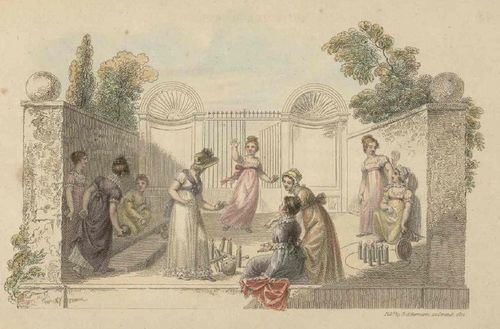Annotation:Nine Pins (1)
X:198 T:Cats In The Village. FTB.198 T:Ninepins. FTB.198 T:Flying Boy,The,aka. FTB.198 M:6/8 L:1/8 Q:120 R:.Jig O:England Z:Chris Partington K:G (B/c/)|d^cde2d|BcBd2c|A2A AGA|B3G2(B/c/)| d^cde2d|B2Bd2c|A2A AGA|G3-G2|| g|fed def|g3d2B|cec BdB|A2AA2g| fed def|g3efg|aba gfe|ded cBA| |"if required"e2eg2g|fefB2B|c2AF2B|G3E2B| e2eg2g|fefB2B|c2AF2B|E3-E2|]
NINE-PINS (NINEPINS) [1]. AKA and see "Cats in the Village," "French Reaper (The)," "Jim Crow Quadrille (3)," "Quadrille 2nd Set – La Poule," "Turfahun Barndance (The)." English, Jig (6/8 time). G Major. Standard tuning (fiddle). ABC. Ninepins is a game similar to bowling, and although there are various rules and procedures for the game, it is generally played with hand-sized balls and a set of nine slender pins arranged in a diamond pattern. The game was popular in Europe for several hundred years before being imported to the New World in the 1600's where it was a favorite with early Dutch and German settlers. Ninepins could even be found in Puritan communities despite the elders' consistent objections to such pleasurable activities. The game of ninepins was a popular betting game, too popular for some lawmakers, who outlawed the game in Connecticut and New York in the early 19th century.
The tune belongs to a large family of tunes under various titles (with no particular one prominent) that were popular in Britain and Ireland from the mid-19th century, surviving into the 20th century (particularly as the first strain of "Dingle Regatta"). The melody was often used as a quadrille part, again, under various titles.


